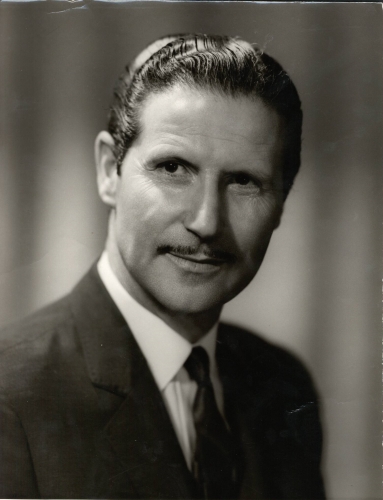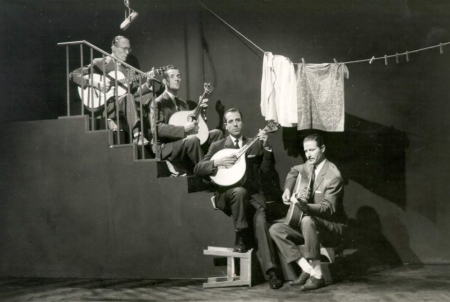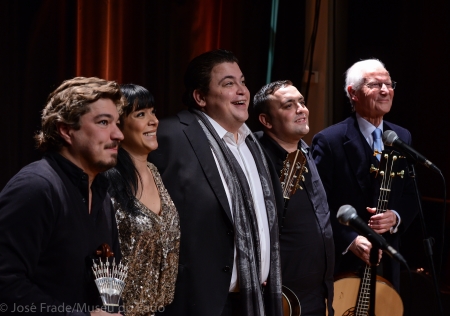Know more:
Joel Pina
(N. 17 February, 1920 - M. 11 February, 2021)Over successive decades and during about 80 years of artistic life, Joel Pina contributed and starred in some episodes of the greatest significance for the history of Fado. Among others, it made a decisive contribution to the consecration of Fado as an Intangible Cultural Heritage of Humanity (UNESCO). With Amália Rodrigues, who accompanied on stages and recordings over 29 years, Joel took Fado to the world. Deeply cherished by different generations of performers and musicians, Joel Pina was - is - a major name in Portuguese music.
On September 24, Lisbon City Hall paid tribute to him at the São Luiz Theater with a concert celebrating his 100th birthday in which Ana Sofia Varela, António Pinto Basto, António Zambujo, Beatriz Felício, Carminho, Gaspar Varela, Gonçalo Salgueiro, Joana Almeida, Joana Amendoeira, João Braga, Katia Guerreiro, Lenita Gentil, Maria da Fé, Mariza, Matilde Cid, Mísia, Nuno da Câmara Pereira, Pedro Moutinho, Ricardo Ribeiro, Rodrigo Costa Félix, Rodrigo Rebelo de Andrade, Tânia Oleiro, Teresa Siqueira, Teresinha Landeiro and Zé Maria Souto Moura participated.
“Fado is the music that moves me the most”, Joel Pina tells us in the documentary “Fado” (Sofia de Portugal Aurélio Vasques, 2012) and it will not be by chance that in his musical journey we found more than six decades of fado.
João Manuel Pina was born in Rosmaninhal, a village in the municipality of Idanha-a-Nova, on February 17, 1920. He adopted the stage name of Joel Pina and the interpretation of the bass guitar for his career as a professional musician.
Joel Pina's name is inseparable from the history of fado, either because of the fundamental contribution he made to the integration of the bass viola in the set of accompaniment instruments for fado, or because of the interpretative quality that distinguishes him in the musical universe, since he became professional in 1949 until today.
Through radio broadcasts, he had his first contacts with Fado as a child and, at the age of 8, started playing, when his father, on a trip to Lisbon, bought him a mandolin. The Spanish guitar and classical guitar followed. His learning was self-taught and through the observation of others, as Baptista Bastos himself described: “in my land one played a lot and then I saw others and perhaps for the sake of intuition I immediately started to play the Spanish guitar and to move the classical guitar too. ” (Bastos: 256).
In 1938 he moved his residence to Lisbon and, as a fado lover, he regularly frequented Café Luso. In that house, he met Martinho de Assunção who, in 1949, invited him to join the Typical Guitar Quartet of Martinho d’Assunção. This group also included Francisco Carvalhinho and Fernando Couto. It is in this group that Joel Pina begins to dedicate himself to the bass guitar and, in this moment, he becomes professional as a musician.
In the following year he joined the cast of Adega Machado, with Francisco Carvalhinho, on the Portuguese guitar, and Armando Machado, on the Spanish one. In this environment Joel Pina begins to build the presence of the bass guitar in the instrumental accompaniment of Fado, which until that time was not usual. He will remain in the cast of this house for 10 years.
In parallel, Joel Pina worked as a civil servant at the Economic Inspection, starting this activity in 1961 and continuing until he retired.
During his professional career, he was one of the founders of the Guitar Ensemble with Raul Nery, Fontes Rocha and Júlio Gomes. This quartet had an extraordinary success and was a milestone in the musical interpretation of the fado universe. The ensemble came at the initiative of Eduardo Loureiro, head of the music department of Emissora Nacional, who invited Raul Nery to form a ensemble, with the intention of presenting a guitar program on the radio every two weeks. In 1959 regular emissions started and the program lasted for 12 years.
Raul Nery's Guitar Ensemble “established a larger instrumental set for the accompaniment of fado and for the execution of the instrumental repertoire related to that genre, also contributing to the formulation of the musical roles of the first and second guitars, as well as the bass guitar.” (Castelo-Branco: 127). In addition to radio broadcasts and the recording of countless albums, the ensemble became popular, also with the most charismatic fado performers, namely Maria Teresa de Noronha or Amália Rodrigues, among many others.
From 1966 on, Joel Pina began to regularly accompany Amália Rodrigues, an activity that they continued for three decades until the end of the fado singer's career. With her, he would travel the stages from all over the world, in countless shows and tours that pass, for example, through Canada, the United States and Brazil (several times), Chile, Argentina, Mexico, England, France, Italy (several times), Russia, five times to Japan, Australia, South Africa, Angola, Mozambique, Macau, South Korea.
Joel Pina's vast career makes the task of enumerating the fadistas with whom he played and continues to accompany, almost impossible. In addition to the aforementioned Amália Rodrigues and Maria Teresa de Noronha, he is also present in the recording of albums and shows by fadistas such as Carlos do Carmo, Carlos Zel, João Braga, Fernando Farinha, Nuno da Câmara Pereira, João Ferreira-Rosa, Teresa Silva Carvalho, Fernanda Maria, Celeste Rodrigues, Carlos Ramos, Lenita Gentil, Rodrigo and, more recently, Cristina Branco, Joana Amendoeira or Ricardo Ribeiro.
His artistic career is widely recognized. In May 1992 he was awarded the Medal of Cultural Merit by the Portuguese State. In 2012 he received the Order of the Infante D. Henrique. In the same year he received the Gold Medal of the City of Lisbon. On September 24, 2020, the Lisbon City Council paid him homage at Teatro São Luiz, unveiling a plaque with his name next to the evocative plaque of Amália Rodrigues whom he accompanied on stage for about three decades.
Source:
“Fado” (2012), documentary by Sofia de Portugal and Aurélio Vasques;
Baptista-Bastos, (1999), "Fado Falado", Col. "Um Século de Fado", Lisboa, Ediclube;
Castelo-Branco, Salwa El-Shawan (1994), “Vozes e Guitarras na Prática Interpretativa do Fado”, in Fado: Vozes e Sombras, Lisboa: Museu Nacional de Etnologia;
Museu do Fado – Interview made on September 21st, 2006.

Joel Pina, s/d

Francisco Carvalhinho, Pais da Silva, Joel Pina, Maria Pereira e Manuel Fernandes, Adega Machado, dec. 1950

Joel Pina, Francisco Carvalhinho e Alfredo Mendes, Adega Machado, s/d

Fernando Farinha e Conjunto de Guitarras de Raul Nery, Eden Teatro, 1962

Conjunto de Guitarras de Raul Nery, Joaquim do Vale e e Maria Teresa de Noronha, s/d

Conjunto de Guitarras de Raul Nery: Júlio Gomes, Raul Nery, José Fontes Rocha e Joel Pina, s/d

Maria de Lourdes Machado, João Alberto, Fernando Freitas, Manuel Martins e Joel Pina, Adega Machado, s/d

Maria da Fé, Carlos Macedo, Fontes Rocha, Paquito e Joel Pina, 1984

Amália Rodrigues e Joel Pina, New Jersey, 1987
